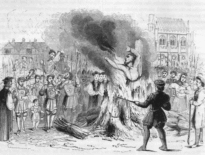 This week's Monday Martyr is James Bainham, who, on 30th April 1532, in the reign of King Henry VIII, was burned at Smithfield.
This week's Monday Martyr is James Bainham, who, on 30th April 1532, in the reign of King Henry VIII, was burned at Smithfield.
Bainham, who hailed from Westbury-on-Severn, Gloucestershire, was the youngest son of Sir Alexander Bainham and his wife, Elizabeth Langley (née Tracy), became a lawyer after entering London's Inns of Court. Bainham's maternal uncle had been a reformer and perhaps he influenced his nephew. According to John Foxe, Bainham was "an earnest reader of Scriptures, [and] a great maintainer of the godly".
Bainham went on to marry the widow of reformer Simon Fish, a man who had been charged with heresy and was awaiting trial when he died of plague in 1531. Fish was the author of the religious pamphlet The Supplication of Beggars, which Anne Boleyn was said to have shared with Henry VIII. The pamphlet was an attack on the Catholic Church. Fish claimed that the Catholic clergy usurped the power of the state and stated that they were treasonous and corrupt. Fish also attacked the sale of indulgences and the doctrine of purgatory. Bainham came to the notice of Sir Thomas More, Henry VIII's Lord Chancellor, due to his links with Fish, and More had him brought to him for questioning. Bainham stood firm in his evangelical faith so More ordered his imprisonment in the Tower of London, where he was also allegedly tortured.
Between December 1531 and February 1532, Bainham underwent several rounds of questioning from John Stokesley, Bishop of London, and finally abjured. He was released but brought before the Bishop of London's vicar-general on 19th April 1532 after publicly recanting his renunciation of his faith and affirming his evangelical beliefs. He was condemned to death for his reformed faith, in particular for calling St Thomas-à-Becket a traitor and attacking purgatory.
He was taken to Smithfield to be burnt on 30th April 1532.
Martyrologist John Foxe wrote of Bainham's burning:
"At whose burning, here is notoriously to be observed, that as he was at the stake, in the midst of the flaming fire, which fire had half consumed his arms and legs, he spake these words: "O ye papists behold, ye look for miracles, and here now you may see a miracle; for in this fire I feel no more pain, than if I were in a bed of down: but it is to me as a bed of roses." These words spake he in the midst of the flaming fire, when his legs and arms, as I said, were half consumed."
You can read John Foxe's account of James Bainham's life, beliefs, interrogation and torture, and execution at http://www.exclassics.com/foxe/foxe177.htm.
Notes and Sources
- Litzenberger, Caroline. “Bainham, James (d. 1532).” Caroline Litzenberger In Oxford Dictionary of National Biography, edited by H. C. G. Matthew and Brian Harrison. Oxford: OUP, 2004.
- Foxe, John. THE ACTS AND MONUMENTS OF THE CHRISTIAN CHURCH, read online at https://www.exclassics.com/foxe/foxe177.htm




Leave a Reply